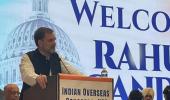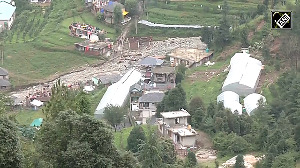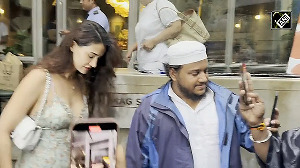Leader of Opposition Rahul Gandhi has indicated that the Congress party is in alignment with the ruling Bharatiya Janata Party led by Prime Minister Narendra Modi on major foreign policy issues like the relationship with the United States, no talks with Pakistan unless the flow of terrorism is stopped, concerns over extremist elements in Bangladesh and Israel.

However, Gandhi, 54, was not in sync with Modi's policies on China, as he alleged that Chinese troops had taken control over Indian territory in Ladakh the size of Delhi.
At a press conference held on Tuesday at the prestigious National Press Club in Washington, DC, Gandhi supported Modi's policies on Pakistan.
Gandhi was on an unofficial four-day trip to the US that concluded Tuesday.
"Pakistan's instigation of terrorism in our country is holding the two countries back. We are not going to accept Pakistan carrying out terror acts in our country. We're just not going to accept it. And until they keep doing that, there's going to be problems between us," Gandhi said.
He said 'No' when asked if the Kashmir issue is holding the two South Asian nations away from a dialogue.
Responding to a question on the India-US relationship, Gandhi noted that it has bipartisan support in both countries.
"I don't see a big diversion. I don't see Modi is diverting very much from our approach with the US. I don't see ourselves changing direction very much from what he's doing. So, I see continuity there," he said.
"I think...everybody does accept the fact that the India-US relationship is key for both countries," he added.
Gandhi asserted that he did not want any role of the US in India's internal affairs. It is for the people of India to decide.
"The fight for democracy in India is an Indian fight. With all due respect, it has nothing to do with anybody else. It's our problem. And we'll take care of it. We will make sure that democracy is secure," he said.
"However, it's important to understand that Indian democracy is more than just any normal democracy because of its size. If you're talking about a democratic vision of the world, then Indian democracy has a large space in that vision. I think it's important that the world sees Indian democracy as an asset, not just for India, but for the rest of the world. Advising the United States on how they should deal with Modi is not my preserve, it's not my space," Gandhi said.
"India has been standing with Israel recently in the Middle East. How would you change that?" he was asked.
"Look, I think what happened on the 7th of October was absolutely wrong. But, I also think what Israel did and is doing, bombing innocent civilians, and killing women and children, is absolutely wrong and should not be allowed to continue. I'm against violence of any kind. And certainly, the scale of violence, I actually think, is harming Israel. It's harming Israel more than it's helping them," Gandhi said.
The Leader of the Opposition was critical of Modi's handling of China.
"Do you think under Modi that India has managed the US-China competition well?" he was asked.
"Well, if you call having Chinese troops in 4,000 square kilometres of our territory handling something well, then maybe. We've got Chinese troops occupying land the size of Delhi in Ladakh. I think that's a disaster. Media doesn't like to write about it," he said.
"How would America react if a neighbour occupied 4,000 square kilometres of your territory? Would any president be able to get away with saying that he's handled that well? So, I don't think Modi's handled China well. I think there's no reason Chinese troops should be sitting in our territory," Gandhi said.
Responding to a question on Bangladesh, Gandhi said, "There are concerns in India about extremist elements in Bangladesh and we share some of those concerns."
"However, I'm confident that things will stabilise in Bangladesh and that we would be able to have a relationship with the current government or any other government after that," he said.
Earlier in the day, Gandhi had a meeting with a group of lawmakers at the US Capitol wherein the issue of Bangladesh was discussed.
"We raised it (Bangladesh), and they also spoke to us. Look, we are against any type of violence. And we want it to stop. And it's the responsibility, frankly, of the Bangladeshi government to stop it as soon as possible. From our side, it's the responsibility of our government to put pressure so that that violence stops," Gandhi said.










